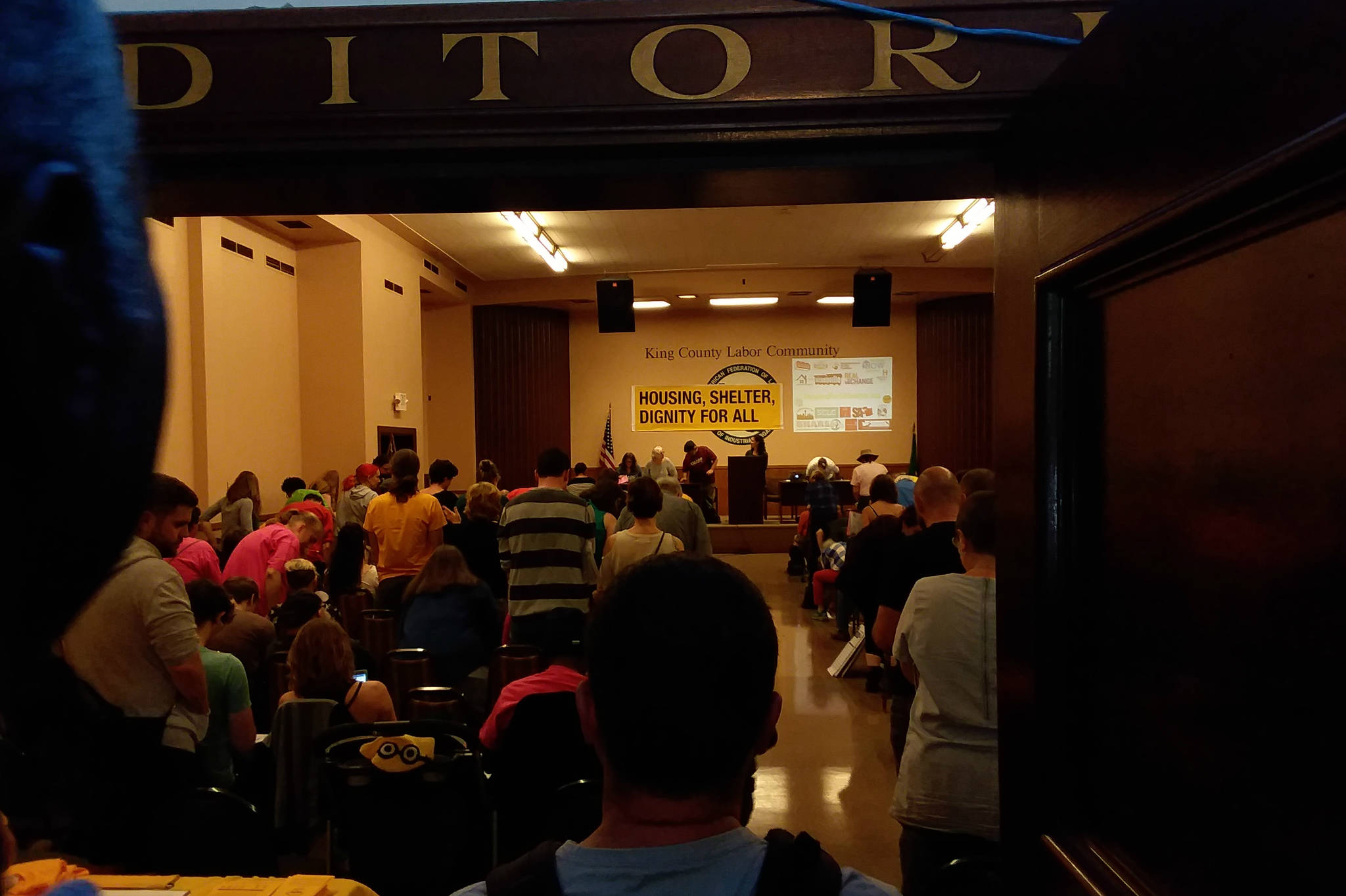The pack of idealistic leftists who got Seattle leaders to pass an income tax have now turned their gaze from the lofty heights of luxury condo skyscrapers and down to the gutter.
What do they want? Housing for all. When do they want it? Starting this fall election season.
The Housing for All Seattle campaign is designed to pressure candidates and city leaders into taking both the affordable housing crisis and homeless peoples’ rights seriously. The HFAS campaign kicked off on Saturday afternoon. Roughly 200 people packed into the Labor Temple in Belltown for about 90 minutes, warming and moistening the air in the auditorium with each breath as they sat in folding chairs or leaned against the wall, listening. On the stage at the front former council candidate Tammy Morales served as emcee. Speakers included Katie Wilson of the Transit Riders Union and SHARE organizer (and the protagonist of my feature Making a Tiny House a Home) Harold Odom, among others. I saw mayoral candidate Cary Moon and council candidate Jon Grant, as well as staff from other council offices.
Wilson spoke to the crowd of the Trump Proof Seattle campaign’s success earlier this year at passing an income tax, which she said “has unnerved the powers that be, because it shows the seeds of a different power—a legitimate power.” But Wilson took care not to kid her audience about their influence. “We didn’t move a mountain earlier this year,” she said. “We shoved a mountain, and it shook a little bit.”
The Housing for All Seattle platform tells elected leaders to:
- Quadruple the current HALA goal for creating affordable housing at 0 to 30 percent Area Median Income (AMI, which in Seattle is $67,200 for a single person) from 6,000 to 24,000 units in ten years;
- Streamline regulations for tiny houses and SROs; stop letting rich people zone poor people out of their neighborhoods;
- De-emphasize market-based Rapid Rehousing, a short-term subsidy for formerly homeless people which assumes they’ll be able to find unsubsidized housing that they can afford within a matter of months;
- Expand a variety of shelter options, including low barrier (for example, open to active drug users);
- Support tent cities and tiny house villages.
In addition, the Housing for All Seattle platform resurrects, in spirit, an ordinance introduced by Councilmember Mike O’Brien last year. The bill, drafted by the state ACLU and Columbia Legal Services, would have typically required the city to direct evicted campers to another site they could use. The bill would have still allowed for evictions from unsafe or particularly unsuitable locations, like a freeway ledge or a sports field, but it would have required authorities in most cases to point to somewhere else campers could move to. “You can’t be here, but you can be there,” basically.
Murray, aided by Sally Bagshaw and others on the Council, managed to scuttle the bill. The effort was hamstrung by thousands of angry letters, phone calls and public comment from homeowners, many of whom erroneously believed that O’Brien’s bill would have given homeless campers a right to pitch camp wherever they wanted.
Housing for All Seattle calls for a bill that would require authorities to only evict camps in locations that are “irremediably unsafe or in conflict with other public uses of the site.” Evicted campers must be offered either real, reliable housing or, failing that, an alternative location that isn’t hanging off a freeway ledge or smack in the middle of a baseball field. At the same time, the city must increase garbage removal, sharps containers (for used needles), pest control, and public restrooms.
The coalition plans to use this fall’s election season to pressure candidates (and elected leaders who are watching them as political weathervanes) to support a human-centered housing and homelessness policy that emphasizes harm reduction in the short term and heavily subsidized public housing in the long term. They’ll use the same tactics that homeowners used last year to shoot down the O’Brien bill: phone calls, letters, public comment, and meetings with leaders. Both the mayor and Councilmember Tim Burgess strongly opposed O’Brien’s bill, and both retire at the end of this year. Consequently, the 2017 campaign season presents a unique opportunity for the coalition to change the direction of homelessness and housing policy.
There is no specific legislation before City Council based on the brand-new platform, but O’Brien has a new bill that would protect some people living in their cars from being ticketed or towed for things like parking violations or expired registrations. That bill has already received some of the same kind of sneaky pushback that last year’s sweeps bill got. Whether it receives the same fate as the sweeps bill depends on whether or not the leftists who packed City Hall every week for an income tax can now muster the same attendance for this new housing justice platform.
cjaywork@seattleweekly.com
This post has been updated.








